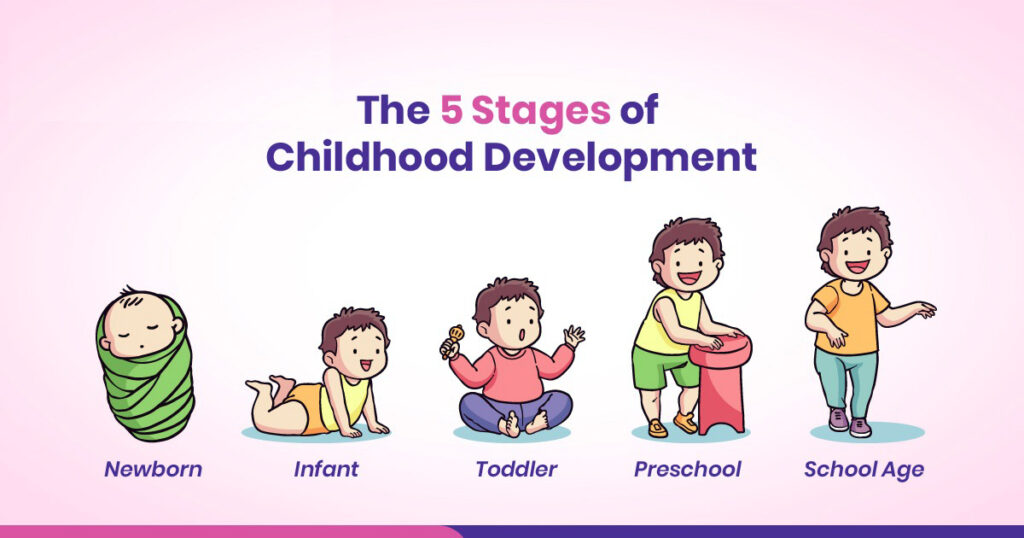Child development is a remarkable journey filled with curiosity, growth, and learning. Understanding the 5 stages of child development is crucial for parents, caregivers, and educators to provide the necessary support and guidance. In this comprehensive guide, we will delve into the intricacies of each stage, exploring the key milestones and factors that influence a child’s growth.
Introduction
Childhood is a time of incredible transformation and development. From the moment a child is born, they embark on a journey of growth, learning, and discovery. It’s a journey that encompasses five distinct stages, each with its unique characteristics and milestones. In this article, we will take a closer look at these stages and gain a deeper understanding of “What are the 5 Stages of Child Development?”
The 5 Stages of Child Development

Infancy (0-2 years) – the 5 Stages of Child Development
The first stage of child development, infancy, is a period of rapid and profound change. During these crucial early years, infants develop the foundation for all future growth and learning. Here are some key aspects of this stage:

- Physical Growth: Infants experience remarkable physical development during this stage. They go from being completely dependent to achieving significant milestones like rolling over, sitting up, and taking their first steps.
- Cognitive Development: Though limited in their ability to communicate verbally, infants are absorbing information like sponges. They begin to recognize familiar faces, respond to sounds, and explore their world through touch and taste.
- Emotional Bonds: Attachment to caregivers is a critical aspect of infancy. Babies form strong emotional bonds with their parents or primary caregivers, which lay the foundation for healthy social and emotional development.
Early Childhood (2-6 years) – the 5 Stages of Child Development
The early childhood stage is a time of rapid growth and exploration. Children in this stage are like sponges, soaking up knowledge and experiences. Here’s what you need to know:

- Language Development: Vocabulary and language skills expand rapidly during early childhood. Children start to express themselves more clearly and engage in conversations with others.
- Social Skills: Early childhood is when children begin to interact with peers and develop essential social skills. They learn to share, cooperate, and navigate the complexities of social relationships.
- Play and Creativity: Play becomes a central activity during this stage. It’s not just fun; it’s also a critical avenue for learning. Through play, children develop problem-solving skills, imagination, and creativity.
Middle Childhood (6-12 years) – the 5 Stages of Child Development
Middle childhood is a period of stability and growth. Children in this stage are typically more self-sufficient and capable of handling various tasks. Key features include:

- Academic Progress: School plays a significant role in middle childhood. Children focus on academic achievements, and their cognitive skills continue to develop rapidly.
- Friendships: Friendships become increasingly important during this stage. Children form deeper and more lasting relationships with peers.
- Physical Skills: This stage often sees a growth spurt, with improvements in physical abilities like coordination and strength.
Adolescence (12-18 years)
Adolescence is a time of immense change and self-discovery. It’s a stage marked by physical, emotional, and cognitive transformations:

- Identity Formation: Adolescents begin to explore their identity, values, and beliefs. They seek independence and question authority as they shape their individuality.
- Peer Influence: Friends have a significant impact during adolescence. Peer pressure and social dynamics play a crucial role in shaping behaviors and choices.
- Cognitive Development: Adolescents develop advanced cognitive abilities, including abstract thinking and problem-solving.
Adulthood (18+ years)
Adulthood is the stage where individuals take on greater responsibilities and independence. Here are some key aspects:

- Career and Life Goals: Adults focus on building careers, pursuing higher education, and establishing families. Their goals and priorities shift towards long-term planning.
- Relationships: Building meaningful relationships, whether romantic or platonic, becomes a central aspect of adulthood. It’s a time for forming bonds and making life-lasting connections.
- Personal Growth: Adults continue to grow emotionally and intellectually, acquiring wisdom and life experiences along the way.
FAQs about Child Development
Q: What is the significance of understanding child development stages? A: Understanding child development stages is crucial for parents and caregivers as it helps them provide appropriate support and nurture a child’s growth effectively.
Q: Are all children’s development stages the same? A: No, every child is unique, and development may vary from one individual to another. However, the stages provide a general guideline.
Q: How can parents stimulate their child’s development during infancy? A: Parents can stimulate development by providing a safe and nurturing environment, engaging in responsive caregiving, and offering age-appropriate toys and activities.
Q: What role does nutrition play in child development? A: Nutrition plays a vital role in child development, providing the necessary nutrients for physical and cognitive growth.
Q: Is adolescence a challenging stage for both parents and teenagers? A: Yes, adolescence can be challenging as it involves navigating through significant changes. Open communication and understanding are essential for both parents and teenagers during this time.
Q: What are some common challenges in adulthood? A: Common challenges in adulthood include balancing work and personal life, maintaining relationships, and making significant life decisions.
Conclusion
Understanding the five stages of child development is not only informative but also essential for anyone involved in a child’s life. From the incredible transformations of infancy to the self-discovery of adolescence and the responsibilities of adulthood, each stage shapes a child into the person they will become. By providing support, guidance, and love throughout these stages, we can help children reach their full potential.

